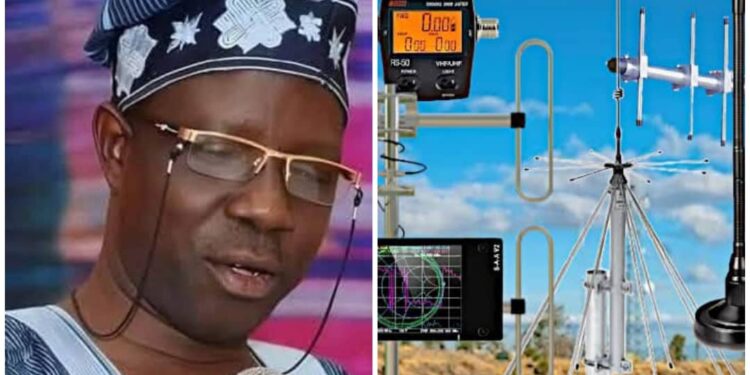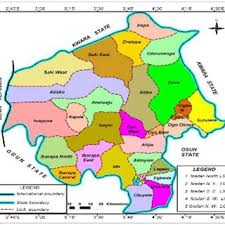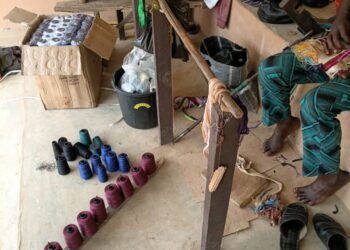Sayo Alagbe
THE CLICHE has more meaning at this juncture: uneasy lies the head that wears the crown. There is no doubt about it that the quartet of: Mass Communication, Theatere Arts, Linguistics and Nigerian Languages, and History Departments; have added value, reputation and glory to the colourful existence of the university.

THE UNIVERSITY has not only repositioned itself for new developments and challenges, but with great prospects and opportunities to move at geometric pace. The sky seems not to be the limit, because the sky shines brightly on the noble performances of the Vice Chancellor. Professor Rasaq Olátúndé ROM Kalilu
WHILE THEATRE Arts’ induction was outstanding and left memory behind, it is imperative to reiterate that the Vice Chancellor’s tenure has been marked by significant achievements across multiple critical areas of university administration, showcasing a commitment to academic excellence, infrastructure development, and institutional sustainability. ScoopChase cannot but x-ray the appraisal of his performance in key areas within the litmus test of an academic session:
TO BEGIN with, it is not by accident that Ladoke Akintola University of Technology, Ogbomosho, is ranked as the best state University in Nigeria. Significantly, while the recognition of the university as the best state institution in the country is an evidence of the Vice Chancellor’s visionary leadership, the ranking reflects advancements in academic performance, research output, faculty excellence, and student satisfactions. The ability to secure such a prestigious ranking demonstrates strategic governance, improved and internally funding generation and utilization; coupled with strengthened industry-academia partnerships.
WITHIN THE scope of the evaluation of Prof. Rom Kalilu’s administration, lies the inevitable and significant differences the newly established departments have brought upon the institution as a whole. It is beyond sheer rhetorics to say that the introduction of new departments under the Vice Chancellor’s leadership reflects a proactive response to evolving academic and industry demands. These departments provide innovative programmes tailored to global trends, enhancing graduate employability. The expansion also showcases the institution’s commitment to multidisciplinary learning and research. Effective resource allocation and faculty recruitment have been pivotal in ensuring these departments meet accreditation standards. Truly, new dawn has arrived.
THE HALLMARK of the Vice Chancellor’s administration is the gradual infrastructural transformation in the university. Investments in modern lecture halls, state-of-the-art laboratories, student hostels, libraries have significantly improved the learning environment. ” The issue of hostel accommodation, based on the facts gathered and as affirmed by the Vice Chancellor, will be through the Build, Operate and Transfer (BOT) approach. Under this system, companies and banks will construct hostels, operate them for a period under contract, and eventually transfer the ownership to the university”.
To cap it all, upgrading faculty buildings and administrative offices underscores the commitment to fostering academic productivity
TO MAINTAIN a stable academic calendar is a major achievement in a sector often disrupted by strikes, funding challenges, or policy inconsistencies. Under the Vice Chancellor’s leadership, students have been able to complete their studies on time, minimizing disruptions and enhancing the university’s reputation for reliability. This consistency indicates strong conflict resolution mechanisms, effective engagement with staff unions, and efficient policy implementation.
IT IS beyond reasonable doubt that the university has solidified its reputation for academic integrity, with strict adherence to ethical standards in examinations, admissions, and faculty promotions. The Vice Chancellor’s emphasis on research credibility, plagiarism detection, and transparent governance has positioned the institution as a model for academic excellence.
LAUTECH F.M.?
A Child of Necessity, New Chapter!
THE ESTABLISHMENT of a university-based radio station marks a forward-thinking initiative aimed at fostering practical learning, community engagement, and institutional visibility. The radio station provides a platform for media students to gain hands-on experience while also serving as a tool for public enlightenment, university announcements, and academic discussions. It enhances the institution’s outreach, strengthens its brand identity, and fosters intellectual discourse within and beyond the campus.
THE VALUES an FM radio station will add to the university and the university community cannot be over-emphasized. Within the contemporary and dynamic educational world, universities continuously seek innovative ways to enhance learning, promote communication, and institutional engagement. One such initiative is the establishment of an FM radio station: a powerful medium that brings immense value to the university as a whole. Beyond being a communication tool, a university-based FM radio station fosters academic growth, community interaction, and professional skill developments.
NOT ONLY does radio enhance academic learning and practical training, for undergraduates pursuing careers in mass communication, journalism, and media studies, an FM radio station provides hands-on experience in broadcasting, content production, and media ethics. It serves as a practical laboratory where students develop skills in reporting, audio editing, and live presenting, preparing them for careers in mainstream media and public relations. How does that sound and the feeling it exudes?
BEYOND MEDIA students, the radio station can support other faculties, providing a platform for educational programmes, research dissemination, academic discussions, etc. Departments such as Political Science, English and Literary Studies, Psychology, among others; can leverage it for discourse on governance, story-telling, and policy-making, enriching the learning experience across disciplines.
RADIO IS like a sword with two edges of sharp intensity. While it strengthens internal communication, it also broadens the institutional branding! An FM radio station serves as an efficient communication bridge between the university management, staff, and students.
RADIO IS a utility platform, which can be used for multi-purpose functions like: widen horizon on serious local, national and international issues. There are reasons to play critical roles in the domestication of global topical issues on socio-economic, political and cultural contexts. Other average roles like important announcements, academic updates, and administrative policies can be broadcast instantly, ensuring that everyone within the institution remains informed. This reduces misinformation and enhances transparency within the university system. The place of email notification cannot play this role efficiently and effectively. Radio station is also a status symbol for an institution.
ADDITIONALLY, THE station acts as a branding tool, amplifying the university’s reputation beyond campus borders. By sharing success stories, research breakthroughs, and student achievements, the institution enhances its public image, attracting prospective students, donors, and partners.
BEYOND THE primary assignment of information, education and entertainment, radio promotes campus culture and student expressions. Most of us don’t need to be reminded that university life is not just about academics: it also involves cultural and social development.
A RADIO station provides a platform for student voices, allowing them to express opinions, showcase talents, and discuss pressing social issues. Programmes that feature music, debates, poetry, and storytelling; contribute to a lively and inclusive campus culture. That’s not abstract to decode.
BY INTEGRATING multilingual programming, the station can celebrate diversity and inclusivity, reflecting the cultural richness of the university community. This strengthens student unity and promotes social cohesion.
RADIO STATION does not exist in isolation. It comes with offer of community engagement and public enlightenment. Not convinced? A university radio station can extend its impact beyond the campus by engaging the local community. Programmes that address public health, environmental conservation, civic responsibility, and entrepreneurship can educate listeners while positioning the university as a hub for knowledge dissemination. Radio establishment is a win-win investment that has never failed!
COLLABORATIONS WITH government agencies, NGOs, and corporate sponsors can further enhance the station’s role in driving social impact. By broadcasting research-based discussions on real-world problems, the university contributes meaningfully to national development.
MOREOVER, SINCE the inception of humanity, humans had been dealing with crisis, its management and emergency responses, have been a challenge. times of crises, such as natural disasters, security concerns, or health emergencies. The radio station can serve as a reliable emergency broadcast system. Real-time information and safety guidelines can be communicated effectively, ensuring swift response and coordinated action among students, staff, and security personnel.
THIS IS an opportunity to create multiple streams of revenue generation for the institution, towards establishing financial sustainability. Beyond puzzle lies the fact that an FM radio station presents economic opportunities for the university. By offering advertising slots, sponsorship deals, and collaborative broadcasting with external organizations, the station can generate revenue to sustain its operations. Additionally, short training courses on broadcasting and media production can be monetized, attracting students and professionals eager to acquire media skills.
BEFORE THE curtain is drawn, it is important to note significantly that the establishment of a university-based FM radio station is not just a technological advancement—it is a transformative asset that enhances academic excellence, institutional communication, cultural expression, and community engagement.
INSIGHTFUL, BY integration of learning, innovation, and public service, the radio station contributes to the holistic development of both students and the broader university community. With strategic planning and stakeholder involvement, it can become a lasting pillar of knowledge dissemination and institutional prestige. There is no substitute for that now. Because it is a trending institutional culture for a university to have a radio station of its own. There are lists of examples within and beyond.
IN CONCLUSION, as a matter of fact and reality checks, the overall verdicts show that the Vice Chancellor’s administration has been marked by remarkable achievements in academic rankings, structural expansions, calendar stability, and institutional credibility. The launch of the university radio station would further enrich and expand the institution’s educational territory.
TO SUSTAIN these gains, continuous investment in faculty development, technological innovation, and stakeholder engagement is recommended. Sincerely, this is just the beginning for Ladoke Akintola University of Technology, Ogbomosho. It is not time yet for the stakeholders to rest. More hands need to be brought on desk. Because, the university competitors are to find rest for their existence.
THE BATTLE is not for the one that runs, but for the visionary who acts on the vision and mission statements. It is still a journey of a thousand miles. This is just the beginning!
You can get every of our news as soon as they drop on WhatsApp ...To get all news updates, Join our WhatsApp Group (Click Here)












